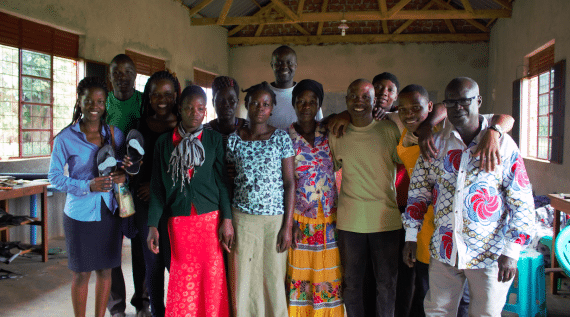Protection of the Environment through Income Generation, LivingStone International University (Uganda)
Protection of the Environment through Income Generation is an initiative that trying to address a growing environmental, social and economic concern in rural Ugandan communities that depend on the environment for survival. This dependency has contributed to the burning of trees for charcoal that is later sold or used for cooking purposes. The pace at which the community is cutting down the trees is unsustainable and has contribute an increasing in the number of landslides, destroying communities and ultimately damaging the environment.
 The program has a long history and was envisioned by Efiti Filliam. “The idea came to me while I was still a young boy. I was brought up by single mother and we depended on agriculture to make money and to survive. While I was a student, I realized that we were destroying the environment through these practices.”
The program has a long history and was envisioned by Efiti Filliam. “The idea came to me while I was still a young boy. I was brought up by single mother and we depended on agriculture to make money and to survive. While I was a student, I realized that we were destroying the environment through these practices.”
Dependency on the environment is very important for the economic survival of Ugandan villages. Many of the students in Livingstone originate from these villages. The program aims to reconnect them to the place where they came from and learn that exploiting its natural resources does not always equal progress. A core objective of the program is for graduates to find novel ways to educate and create their social enterprises that illustrate the possibilities of income generation to their communities and to themselves.
What is unique about the program?
About 80% of the African continent depend on the environment. The government has drafted and enacted policies with the goal of protecting the environment like, for every tree that is a cut, five must be planted. They are missing a key point: how can communities that depend on it continue to prosper?
This project achieves the goal of protecting the environment and generating income for the community by:
- Rural communities use the environment more carefully and think about the effects if exploited
- The students and the community develop an income generating project that will form part of their main livelihood thus breaking the dependency on cutting trees and exploiting the environment
- Students create their own jobs, give back to their communities and don’t have to rely on the poor economy for their livelihood.
The community and the students have developed a strong model of working together for the benefit of the community. For example, two students have created women community groups and trained them on managing finances. The students have taught them that not using charcoal saves their households money. The students also contribute to the the spiritual growth of the community.
Students take on various leadership roles to support the community in their social enterprises. They also help them become empowered to believe that they have the leadership and the knowledge to progress and protect the ground they live on.
The students have also gained a lot from participating in the program. “This has been a great experience and feel very proud of the skills I have gained. I believe they are skills that can be applied in any setting.” – Rehema